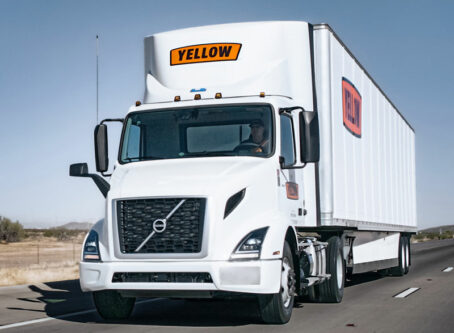Norfolk Southern puts LTL freight on rails
Norfolk Southern Railroad has re-introduced an LTL freight service similar to what railroads abandoned long ago. The service Norfolk Southern calls “Thoroughbred Freight Transfer” debuted this summer and is part of an “effort to convert highway traffic to rail,” according to Trains.com. The service is experimental, according to the railroad, which did not respond to an email request for comment.
The idea is an old one. Local and regional trucks bring LTL shipments to docks with rail sidings where freight is sorted and loaded onto boxcars for linehaul. At the destination, the freight is unloaded and delivered by local trucks. That’s the way most regulated freight moved when America’s roads were mostly two-lane blacktop and the shipper or consignee did not have access to a railroad siding. Back then, lots of LTL freight and what we now consider truckload was handled by what were called “car loaders.”
Car loaders were considered freight forwarders because they contracted for the entire move, including truckers at both ends of the move and railroads in between. Some had their own trucking operations, especially in big cities like New York, Chicago and Los Angeles, where big companies like Clipper Carloading, Republic Carloading, and Lifschultz Forwarding often had local trucking operations. Their trucks were as common on the streets as those of motor carriers. Car loaders offered coast-to-coast LTL service long before truckers were able to piece together cross-country operating authority in the early 1960s.
That’s when car loaders began to die off. The interstate highway system came into wide use, and big LTL truckers like Consolidated Freightways, Time-DC, and Pacific Intermountain Express were able to offer long haul LTL service.
In the 1960s, car loaders began avoiding small shipments of under, say, 500 pounds.
They were still able to move large shipments at a cost savings, but truckers offered faster service.
By the end of the 1970s, motor carriers had driven the last of the car loaders out of business. Since then, industrial parks and even large distribution centers have been built without rail sidings that were once a critical requirement.
There is a difference between Norfolk Southern’s regular boxcar service and Thoroughbred Freight Transfer. TFT boxcars move on regularly scheduled intermodal trains instead of ordinary freight trains. That eliminates the need for the boxcars to be “humped,” the railyard process of assembling freight trains by rolling them down an incline – the “hump” – where they are switched onto the correct siding for a particular train. That makes the TFT trip quicker and more predictable, according to Norfolk Southern. It’s similar to the old days when U.S. mail rode on rail cars attached to regularly scheduled passenger trains.
It’s a limited effort for sure. It began with service to three metro areas: Chicago, Atlanta and Miami. Since then, Norfolk Southern added service to Jersey City, N.J., in the heart of the New York metro area.
A railroad boxcar can be from 50 to 60 feet long and can carry up to 200,000 pounds of freight, the rough equivalent of four truckloads. But since it involves handling and takes longer than truckload, TFT service is unlikely to attract truckload freight.
“The potential market … includes freight that’s heavy or odd-sized, a segment that less than truckload carriers try to avoid,” Norfolk Southern Vice President Ed Elkins told Trains Magazine.
Martin J. Oberman, chairman of the Surface Transportation Board, praised the TFT service.
“As you know, I have been emphasizing the importance of shifting freight from truck to rail, which I believe we all agree better serves the public with cleaner air and safer highways,” Oberman wrote in a letter to Norfolk Southern’s CEO. “This less-than-carload service also allows NS to maximize utilization of boxcars at a time when we are facing an international shortage of containers.”
The federal government created the Surface Transportation Board when it finally abolished the old Interstate Commerce Commission in the mid-1990s. The board oversees “the economic regulation of various modes of surface transportation, primarily freight rail,” according to its website.
Norfolk Southern’s Elkins stressed the experimental nature of the TFT service.
“I don’t know if a year from now we’ll still be doing this experiment,” he told Trains Magazine. “We may be bigger. We may be smaller. We may not be doing it.” LL









